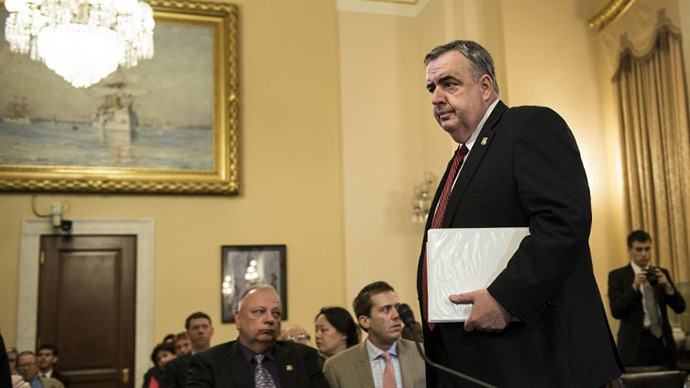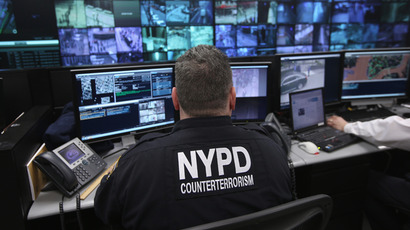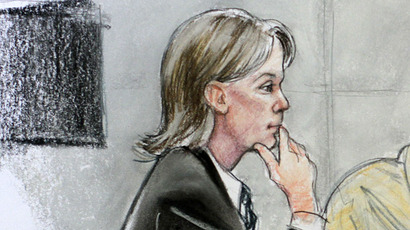‘Our homeland defense system failed’ - Congress holds first hearing on Boston bombing

Boston Police Commissioner Ed Davis entertained questions from the United States House Committee on Homeland Security Thursday morning as lawmakers learn if last month’s terrorist attack could have been prevented.
Authorities attribute three casualties and more than 260 injuries to a pair of ethnic Chechens brothers accused of detonating explosives near the finish line of the Boston Marathon last month in the state of Massachusetts. But as investigators learn that the Tsarnaev family raised international red flags in the years before the April 15 tragedy, congressional leaders are looking to see what could have been done to thwart the attack.
Investigators say 26-year-old Tamerlan Tsarnaev and his 19-year-old brother Dzhokhar plotted the attack and intended to detonate more explosives in New York City if they could ever made it out of Massachusetts. During the Thursday morning hearing, Commissioner Davis was grilled over what the city of Boston — as well as state and national law enforcement — could have done to curb plots to terrorize the citizens of both cities.
Davis said the Boston Marathon bombing created “the most complex crime scene we ever processed in the city.”
In a statement published before the testimony began, the commissioner advocated for having more resources that might be able to give law enforcement the upper-hand in instances where future plots are being hatched. Ultimately it was footage of the Tsarnaev brothers caught on surveillance cameras that led authorities to identify them as suspects in the bombing, and many have made a push in the weeks since to increase the number of cameras across the city. Speaking to the committee on Thursday, Davis suggested he stands in line with this take but does have reservations about what it could lead to.
“I strongly support the enhanced ability to monitor public places,” Davis said. “This monitoring . . . violates no constitutionally protected rights but gives police the ability to investigate and effectively prosecute. Images from cameras do not lie. They do not forget.”
But in the wake of what unfolded in his city last month, civil liberty proponents have condemned the response in Boston and elsewhere. Davis’ city was placed on lock-down after the bombings during a manhunt for the Tsarnaev brothers, and heavily armed police conducted warrantless searches of homes across the region. Coupled with calls for increased surveillance, critics have blasted Boston’s response and have warned of what could come next.
“I do not endorse actions that move Boston and our nation into a police-state mentality, with surveillance cameras attached to every light pole in the city,” Davis added with his statement.
Elsewhere in the hearing, Massachusetts Undersecretary for Homeland Security Kurt N. Schwartz said Boston’s transit and traffic cameras are already linked to “a quite complex, sophisticated system,” but that admission didn’t deter members of the House from inquiring about other means of foiling future plots.
Joe Lieberman, a former Independent senator from Connecticut and co-architect of the US Department of Homeland Security, opined at the hearing that the DHS was designed after the September 11 terrorist attacks essentially to prevent events like Boston from ever unfolding.
“Though it would not have been easy, it was possible to prevent the terrorist attacks in Boston,” Lieberman said.
The former senator took several opportunities throughout the hearing to offer criticism aimed at the DHS. “To put it bluntly, our homeland defense system failed in Boston,” he said in a statement offered before he took the microphone.
Of particular concern, he would later explain, was how information sharing between agencies didn’t occur to a degree that ended with Tamerlan Tsarnaev being detained, or even deported, after Russian intelligence notified the US Federal Bureau of Investigation about him years before the attack.
“Why didn’t the [Department of Homeland Security] notify the FBI and the Boston JTTF [Joint Terrorism Task Force] when its system ‘pinged’ that Tamerlan Tsarnaev had left America for Russia on his way to Dagestan?” Lieberman asked.
But while Lieberman suggested that US agencies didn’t do their job properly, he had powerful words for Moscow too. “It could be that the most consequential failure to share information was the failure of the Russian intelligence to explain in more detail to us why they were interested in Tamerlan Tsarnaev,” he said.
“I’m agitated by,” he said, “why nobody was particularly looking for the name Tamerlan Tsarnaev by the time he came back.”
“Someone should have been on him,” he said.
Commissioner Davis admitted during the hearing that the FBI failed to inform the Boston Police Department about the Tsarnaev family despite Russian intelligence issuing a warning to the US.
When Rep. Michael McCaul (R-Texas) asked, “Were you aware of Russian intelligence warning?” the police chief responded that he was “not in fact informed of that particular development.”
“[W]e would have liked to know,” Davis said.
“The whole point of the fusion centers and the Joint Terrorism Task Forces is to share information,” McCaul said. “The whole idea of information not shared defies why we even have a Homeland Security Department in the first place.”














